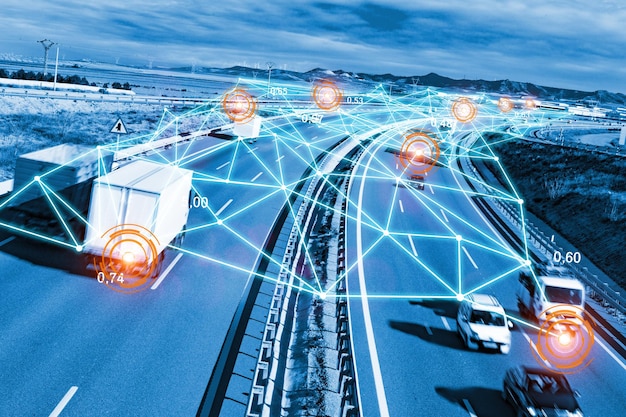How 5G Will Reshape US Industries by 2025: A Deep Dive

The proliferation of 5G technology is poised to revolutionize various sectors in the United States by 2025, enhancing connectivity, automation, and creating new opportunities across industries from healthcare to manufacturing.
The dawn of how 5G Advancements Will Reshape US Industries by 2025, promising unparalleled speeds and connectivity that will redefine operations, customer experiences, and competitive landscapes across the United States.
5G: The Infrastructure Revolution
5G technology is more than just faster internet; it’s a foundational shift in how data is transmitted and utilized. This section explores the potential infrastructural transformations driven by 5G.
With its ultra-low latency and massive network capacity, 5G is set to support a wide array of transformative applications. Let’s explore what this means for different sectors.
Enhanced Connectivity
One of the primary advantages of 5G is its ability to provide enhanced connectivity. This means faster speeds, lower latency, and greater capacity, resulting in more reliable communication networks.
Supporting IoT Devices
5G is also designed to support a massive number of Internet of Things (IoT) devices. This is crucial for smart cities, industrial automation, and connected homes, all of which rely on numerous sensors and devices communicating in real-time.
- Smart Cities: 5G will enable smarter traffic management, energy conservation, and public safety through connected sensors and devices.
- Industrial Automation: Factories can use 5G to connect machinery, robots, and sensors, improving efficiency and reducing downtime.
- Connected Homes: 5G supports a seamless experience for smart home devices, enhancing security, entertainment, and convenience.
5G’s ability to provide robust and reliable connectivity will pave the way for innovations that were previously constrained by technological limitations. Expect to see significant advancements across various industries.
Healthcare Transformation
The healthcare industry is poised for a significant transformation with the advent of 5G. This section will delve into the specific applications and benefits that 5G will bring to healthcare by 2025.
From remote patient monitoring to telemedicine, 5G capabilities will enhance the quality, accessibility, and efficiency of healthcare services.

Remote Patient Monitoring
5G will enable real-time remote patient monitoring through wearable devices and sensors. This allows healthcare providers to track patients’ vital signs and health conditions from a distance, improving outcomes and reducing hospital readmissions.
Telemedicine and Virtual Consultations
Telemedicine, significantly enhanced by 5G, will provide patients with access to virtual consultations and medical advice from anywhere. This is particularly beneficial for patients in rural or underserved areas.
- Improved Accessibility: Telemedicine will make healthcare more accessible to individuals who may face geographic or mobility barriers.
- Real-Time Diagnostics: 5G’s low latency will facilitate real-time diagnostics and remote surgeries, providing immediate care.
- Cost Savings: Reduced hospital visits and improved monitoring can lead to significant cost savings for both patients and healthcare systems.
5G will catalyze numerous innovations in healthcare, enabling more proactive, personalized, and accessible medical services. The industry will continue to adapt to fully harness this technology.
Manufacturing Revolution
The manufacturing sector is on the cusp of a revolution driven by 5G technology. This section explores how 5G will transform traditional manufacturing processes.
5G will enable smarter, more efficient, and more flexible manufacturing operations through enhanced automation, real-time data analytics, and improved connectivity.
Smart Factories
5G will facilitate the development of smart factories, where machines, sensors, and robots are interconnected, sharing real-time data to optimize production processes.
Predictive Maintenance
5G’s low latency and high bandwidth support predictive maintenance. This means manufacturers can use real-time data from sensors to predict when equipment needs maintenance, reducing downtime and saving costs.
- Enhanced Efficiency: 5G-enabled sensors can monitor machine performance, energy consumption, and environmental conditions, optimizing overall factory efficiency.
- Reduced Downtime: Predictive maintenance helps identify potential equipment failures before they occur, minimizing unplanned downtime.
- Improved Safety: Real-time monitoring and automated responses can improve safety by quickly addressing hazardous situations.
The adoption of 5G in manufacturing will lead to significant improvements in productivity, efficiency, and safety. Factories will become more agile and responsive to changes in demand, ensuring a competitive edge.
Transportation and Logistics
The transportation and logistics industries are set to experience dramatic changes thanks to 5G. This section highlights the ways 5G will optimize and streamline operations.
5G will enable real-time tracking, autonomous vehicles, and smart logistics, revolutionizing how goods and people are transported.
Autonomous Vehicles
5G’s ultra-low latency is critical for autonomous vehicles, enabling them to communicate with each other and with traffic infrastructure in real-time. This will improve safety, reduce congestion, and enhance the overall driving experience.
Real-Time Tracking and Logistics
5G will provide logistics companies with enhanced real-time tracking capabilities. This allows them to monitor the location and condition of shipments in real-time, improving efficiency and reducing losses.

- Improved Efficiency: Real-time tracking and optimized routes will improve the efficiency of logistics operations, reducing delivery times and costs.
- Enhanced Safety: Autonomous vehicles and advanced driver-assistance systems, powered by 5G, will significantly improve road safety.
- Smart Logistics: 5G will enable the development of smart logistics systems, allowing for better coordination and management of supply chains.
The transportation and logistics industries will be transformed by 5G. The efficiencies and safety improvements will contribute to significant economic benefits for businesses and consumers alike.
Entertainment and Media
The entertainment and media industries will undergo a significant transformation thanks to 5G, offering immersive experiences and new ways to consume content.
5G will enable enhanced streaming, augmented reality (AR), virtual reality (VR), and interactive gaming experiences, changing how we engage with media and entertainment.
Enhanced Streaming
5G’s high bandwidth will allow for seamless streaming of high-quality video content, including 4K and eventually 8K resolutions, without buffering or interruptions.
Augmented and Virtual Reality
5G will unleash the full potential of Augmented Reality (AR) and Virtual Reality (VR) applications, offering immersive gaming, entertainment, and educational experiences.
- Immersive Gaming: Gamers will enjoy low-latency and high-resolution gaming experiences, allowing for more engaging and interactive gameplay.
- Interactive Entertainment: 5G will enable new forms of interactive entertainment, such as live concerts with augmented reality elements or virtual tours of historical sites.
- Enhanced Education: AR and VR applications will revolutionize education, providing students with immersive and interactive learning experiences.
The entertainment and media industries are set to be revolutionized by 5G. The enhanced streaming capabilities and immersive AR/VR experiences will create new opportunities for content creators and consumers.
Agriculture and Farming
5G technology is set to bring unprecedented advancements to agriculture and farming practices. This section explores how 5G will enhance the efficiency and sustainability of these vital sectors.
From precision agriculture to smart farming, 5G connectivity will enable more data-driven and automated approaches that improve yields and reduce environmental impact.
Precision Agriculture
5G will facilitate precision agriculture through the use of sensors, drones, and other IoT devices. These technologies will collect real-time data on soil conditions, weather patterns, and crop health, allowing farmers to optimize irrigation, fertilization, and pest control.
Smart Farming
5G will enable smart farming practices, where data analytics and automation are used to improve efficiency and reduce waste. This includes automated irrigation systems, robotic harvesting, and data-driven decision-making.
- Increased Yields: Precision agriculture techniques will help farmers optimize resource use, leading to higher crop yields.
- Reduced Waste: Data-driven decision-making will help farmers reduce waste by avoiding over-irrigation, over-fertilization, and unnecessary pesticide use.
- Sustainable Practices: Smart farming practices will promote environmental sustainability by minimizing water use, reducing chemical inputs, and improving soil health.
5G will transform agriculture and farming practices. The data-driven and automated approaches will lead to more efficient, sustainable, and profitable operations, ensuring food security and environmental stewardship.
| Key Area | Brief Description |
|---|---|
| 🏥 Healthcare | Enables remote monitoring and telemedicine for improved patient care. |
| 🏭 Manufacturing | Supports smart factories with real-time data and predictive maintenance. |
| 🚚 Transportation | Enhances logistics with autonomous vehicles and real-time tracking. |
| 🎬 Entertainment | Offers enhanced streaming and immersive VR/AR experiences. |
Frequently Asked Questions
▼
5G will significantly improve healthcare access in rural areas through telemedicine, remote patient monitoring, and faster data transmission for diagnostics, bridging the gap in healthcare services.
▼
5G will enable real-time data exchange, automation, and predictive maintenance in smart manufacturing, boosting efficiency, reducing downtime, and enhancing overall productivity.
▼
5G will enhance transportation logistics via real-time tracking, autonomous vehicles, and optimized routing, resulting in faster delivery times, reduced operational costs, and improved safety.
▼
5G will bring advancements such as high-resolution streaming, immersive AR/VR experiences, and interactive gaming, transforming how consumers engage with digital content and entertainment.
▼
5G improves agriculture practices through precision farming, drone-based monitoring, and IoT sensors, enabling optimized resource use, decreased waste, and sustainable farming methods.
Conclusion
In conclusion, the advancements in how 5G Advancements Will Reshape US Industries by 2025, ushering in an era of unprecedented connectivity and efficiency across various sectors, from healthcare to entertainment, promising transformative changes to the US industrial landscape.





